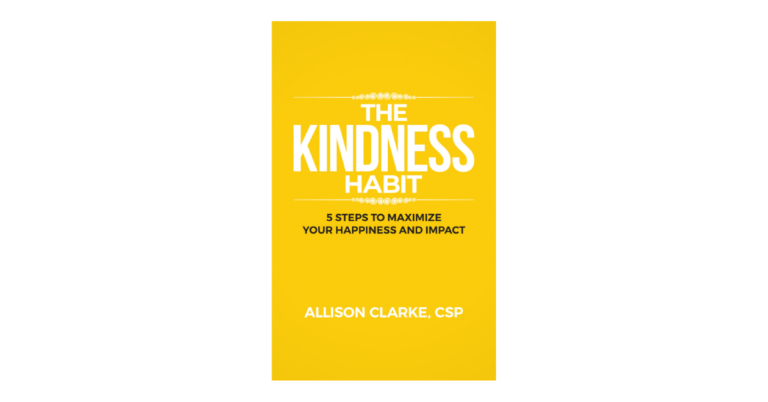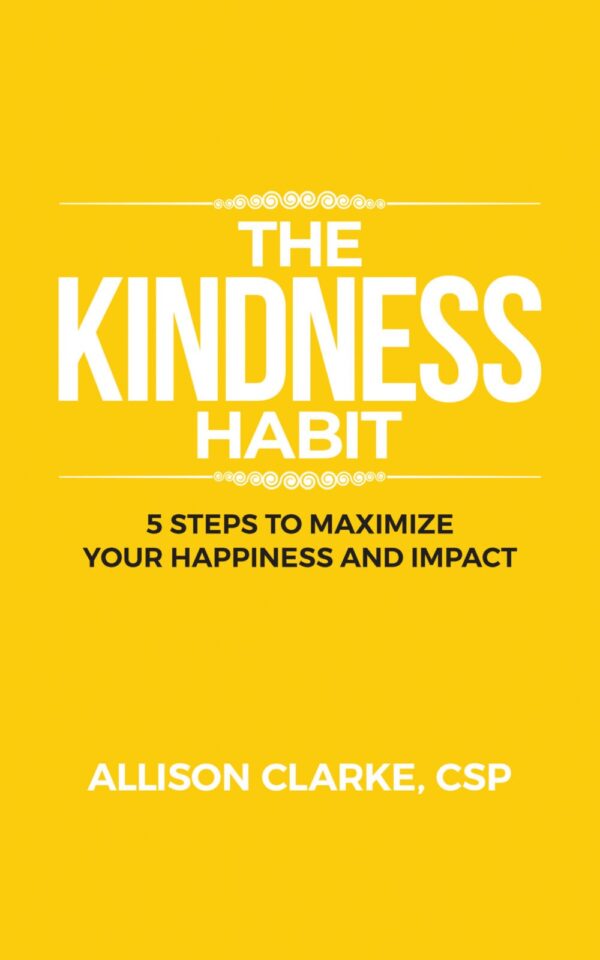
Review & Summary: The Kindness Habit by Allison Clarke
Do you have a kindness habit? Solid science suggests you should—not just for others’ sake, but for your own sake, as well. Your success, health, and even longevity will get a boost if you develop a kindness habit. Fortunately, author and speaker Allison Clarke helps us do just that.
The world may not feel very kind to you, during tough times like we are experiencing in 2020. It may feel harder to be kind to others when you are struggling with a variety of unpleasant emotions. But in these tough times, we all could use more kindness. Not just kindness toward us, but kindness from us.
But how can we do that when we are so busy, even overwhelmed? Ms. Clarke gives us a step-by-step guide in her helpful book The Kindness Habit: 5 Steps to Maximize Your Happiness and Impact:
Step 1: Stop during your daily routine

To be kind to others, we first need to make space to notice other people. The author urges us to pause and look up from our technology, which creates an opportunity to pay attention to the people around us. She encourages us to start practicing kindness at work, which of course I wholeheartedly agree with! Allison offers us these and several other ideas to pause and practice kindness:
- Celebrate people’s milestones
- Listen if someone is hurting or sad
- Put away your phone in meetings
- Offer to be a mentor
It’s a great, practical list of kind moments that can be acted on even if you are working remotely.
Step 2: Look up and notice your surroundings
Paired with Step 1, this step offers opportunities to be kind. You can’t be kind to someone who’s having a tough time if you don’t realize they’re having a tough time. Leaders have presence; be present so you can notice who around you might need a boost. Allison cites research studies and other great books to help us see how much of our lives are on auto-pilot. We often go through the motions of our day without really thinking about it.
Instead, Allison encourages us to be here, now. Clarke points out that, “We want to be seen, heard, and acknowledged by those around us.” So true! By looking up and noticing your surroundings (including the people you interact with virtually), you’re in a position to satisfy this universal need to be seen.
Step 3: Smile and take a deep breath
Clarke shares data that children smile an average of 400 times per day, but adults only smile an average of about 40 times per day. That’s right; the average person is smiling 1/10th as often as they did as a kid.
Why does this matter? Because as the author says, only when we enliven our body and brain are we in a position to give attention to others with sincere joy.
One reason I love this book is that it’s not just Allison’s opinion. She backs up her assertions with solid data from peer-reviewed studies, well-researched books, and Harvard Business Review. Research shows that smiling can cause—not just reflect—positive emotions inside us. When we give ourselves reasons to smile (or smile even when we don’t have a good reason), we boost our own well-being. This puts us in a better position to authentically be kind to others.
Of course, most of us have excellent baloney detectors! We know when other people are full of it. So don’t fake kindness. Instead, smile, feel the positive emotions inside yourself, and then use those to fuel genuine kindness to others. If you can manage this, then you’re ready for the next step.
Step 4: Appreciate one person each day
Ms. Clarke shares clear data: the vast majority of us are buoyed by appreciation. And the corresponding lift in mood leads to more creativity, resilience, and success at work. (That won’t be surprising if you’ve learned anything from Happy Brain Science in the past; our company is grounded in the fact that happiness boosts success.)
But most of us aren’t taught how to give meaningful appreciation. We might be good at saying “Thanks,” but not as good as making our appreciation specific and impactful. Again, Allison shows us the way:
- Think about what you admire about a colleague
- Be specific
- Be sincere
- Give praise to everyone
- Keep it classy
- Make appreciation a daily event
The Kindness Habit gets into many specifics, to explain the above list and give us practical examples to follow.
Step 5: Remember your positive impact on others
Allison invites us to remember people who have made a positive difference in our lives. When we appreciate the impact others have had on our lives, we are more motivated to be that person for someone else. Furthermore, we experience a lift in our mood when we think of our kindness toward others. Indeed, science has found that kindness is win-win. In fact, the person being kind typically enjoys an even bigger mood boost than the recipient.
She practices what she preaches; you should, too!
I want to be transparent; Allison and I are friends. We are in the same “mastermind group” of professional speakers in Oregon. You might think that this biases me to give her a positive review of her book. That may be true, but without a doubt, Allison and her book deserve a glowing review.
In the few years I’ve known Allison, she has done all these kind things for me, and more:
- Given me aromatherapy oils to help me sleep better
- Sent hand-written cards with condolences and congratulations
- Arranged for the delivery of a fruit basket during tough times
- Gifted me a projector screen with a home movie-watching basket for my family
- Smiled at me when I needed it
- Given me constructive criticism and suggestions for improvement when I needed those
- Truly listened

That’s a partial list, and that’s just what she’s done for me personally! I’ve seen her offer countless acts of kindness to others, as well.
Allison is a happy, effective person; her kindness helps make her so. Her research-based tips in The Kindness Habit will help you become more consistently kind, so you can more often enjoy the happiness and success that arise as a result.
I recommend this book without hesitation, for anyone who wants to help the world be a kinder place. The world needs you. Will you develop a kindness habit?
We’d love to hear from you! What strategies have you found helpful to contribute to a culture of kindness at work? What strategies are you eager to try? Thanks for commenting below, connecting with us through any of our social media channels, or contacting us here.